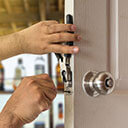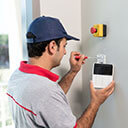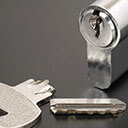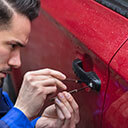When you face problems with locks and keys, here's what you can do
We may not think about them much, but actually, keys and locks ~ residential, automotive, and commercial ~ play a big role in our personal and business lives, throughout the day and all through the night. We truly don’t give locks and keys a second thought…until that one time…when an emergency arises! A lockout emergency, or any other challenge you encounter with keys and locks, is always exasperating, and certainly never convenient. But there’s no reason to despair. There are many things you can do to avoid most of the hassles that could occur with locks and keys, and to keep yourself secure.
How to Handle Broken & Stuck Keys
Slow down. Don’t hurry with your keys! If you rush, you may find yourself stalled in your tracks, because your key has broken off in the lock! Take a few extra seconds with your key, and you’ll save yourself grief in the future.
If you’re unlucky enough to have your key break inside the lock before you shut the door, you won’t be able to lock it, which will leave your home, place of business, or vehicle vulnerable to burglary. If you break a key off in the lock mechanism after you’ve closed the door, you will probably be unable to open the door again. Obviously, a broken key can also cause damage to the lock itself.
- If you can see part of the key is stuck inside of the lock, it might be possible to get it out. If there’s enough of the key visible, you may be able to pull it out with your fingers, or with a pair of needle-nose pliers. However, if there’s any damage, then it’s time to call a professional locksmith.
- If you cannot see any part of the key sticking out of the lock, it’s risky, because you may cause damage, but it may still be worth it to try pulling out the broken key. Get a flathead screwdriver that’s small enough to fit into the keyhole. Pry the key inside to the point where it slightly comes out of the lock. Then you may just be able to remove it with pliers or your fingers.
Preventive Maintenance for Your Locks
If you keep your locks well maintained, you will rarely need to call a locksmith. Keep an eye out for:
- any difficulty turning the key in the lock
- rust
- wear and tear
- any trouble sticking the key into the lock mechanism
If you notice any of these issues, it is probably best to change your locks, because worn-out locks are more prone to break. With old and faulty locks, you are more vulnerable to theft.
Here’s what you can do to prolong the life of your locks:
- General lubrication. Twice annually, apply a silicone-based lubricant spray to the keyholes. Or, lubricate anytime you notice any grinding or excess friction in the lock.
- If your key doesn’t turn, don’t fret. Sometimes the pins get jammed. You may not need a locksmith at all, if you try spraying the lock mechanism with WD-40 or silicone spray. Often this will solve the problem, so it’s worth a shot.
- Replace your keys periodically. Our keys take quite a beating, as we jam them in and out of lock mechanisms many times per day, throw them around a lot, and keep them who knows where. So if you notice that your keys are starting to wear down, it’s time to make a new key. Be sure to toss out old ones.
Take Extra Security Measures
Depending on your location and living circumstances, if you’re feeling vulnerable at your place of residence or at your business, there are many ways to give yourself more peace of mind.
Professional locksmiths recommend you install deadbolts. When you replace your locks with deadbolts, consider the various types, and choose the one that’s right for you. For instance, if you have a window on or near your door, a thumbturn deadbolt isn’t going to do you much good, because a thief can knock out the glass, reach a hand in, and turn. To prevent a break-in, get a double-cylinder deadboltlock, which requires a key on the inside. Whatever deadbolt you choose, be sure they’re correctly installed. A deadbolt should have at least a 1” throw. On the strike side, there should be a security plate with screws at least 3” long, which goes all the way into the door’s wooden frame. To understand all your options, consult with a locksmith professional who’s glad to answer all your questions.
Here are some more ways to provide additional safety and security:
- use only reputable prime-quality brands, at least a grade 2
- install an alarm system
- keep your valuables and important papers in a safe
- hire only a local, trusty expert locksmith ~ bonded, background-checked, insured, certified, and licensed
- use magnetic locks
- install and keypad system or use keyless remotes
When Is It Time to Change the Locks?
- A new home. If you’ve just moved into a new place of residence, then change the locks as soon as possible. You never know who could still have their old keys.
- New roommates or tenants. The same rules that apply to your home apply to rentals. If you rent out space in your home or your apartment, or if you have rental properties of any sort, you must replace locks every single time you change occupants. Even if the last tenants returned their keys, you can’t be totally certain that there aren’t extra copies floating around out there.
- After a break-in. All outdoor locks, which would allow access to an intruder, must be replaced immediately. You may prefer to replace any inside locks too, according to your personal security priorities.
- Lost keys. If you have lost your keys beyond a doubt, then change your locks right away. You simply don’t want the possibility of a stranger gaining access to your home.
Locksmith Articles
- Have you lost your transponder key
- What to do when dealing with ignition cylinder problems
- Why to call a locksmith during a lockout
- Access control
- Secure your home and garage
- Symptoms of car ignition problems
- Why you should keep a safe in your home
- What to do if your safe is jammed
- When to replace locks
- Having a key replaced better than having it rekeyed
- Additional security
- How to prevent them
- When you face problems with locks and keys
- Get help from a certified locksmith
- Various kinds of locks
- Protecting Your Home When Out Of Town
- VWhen You Should Call for Emergency Locksmith Help







